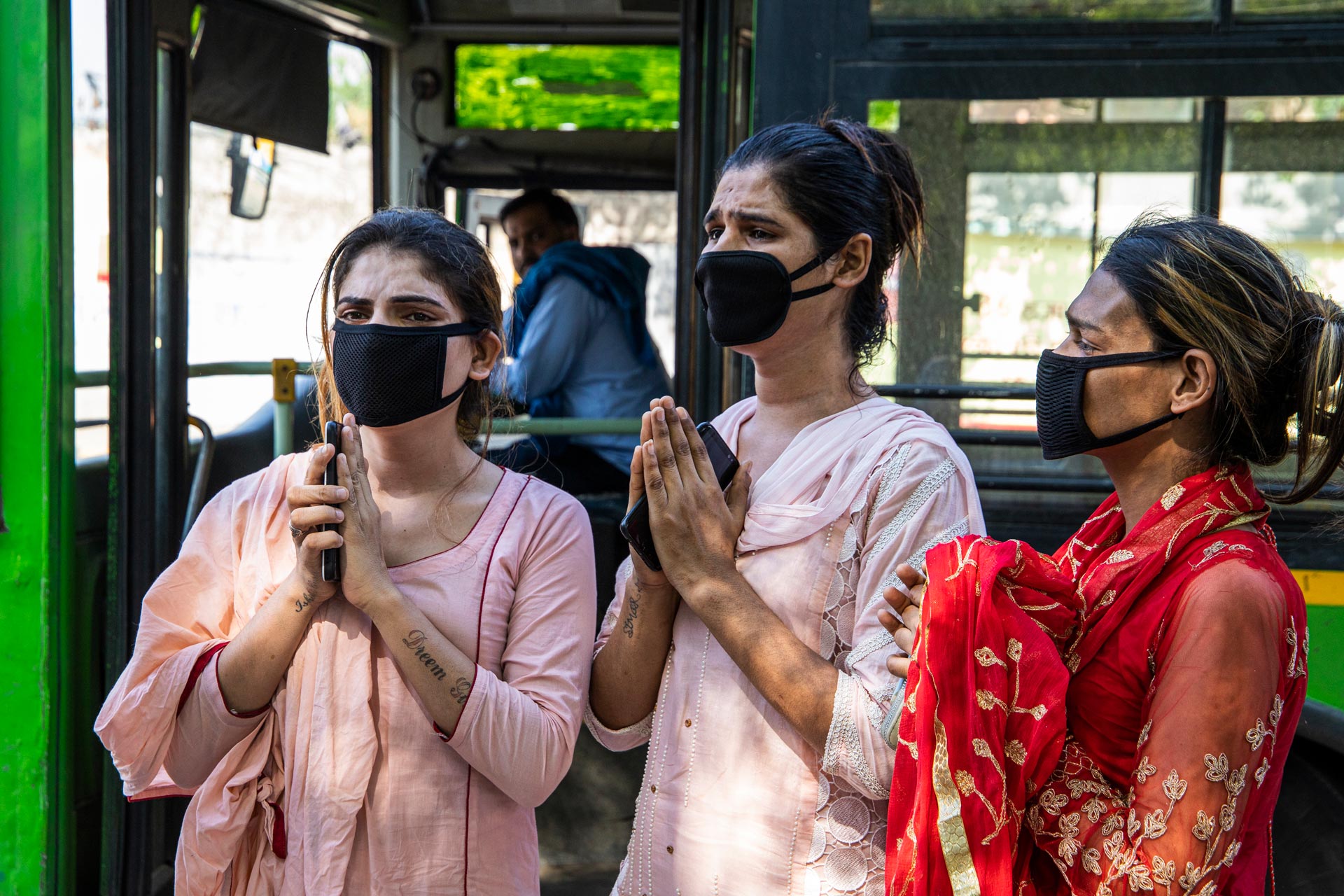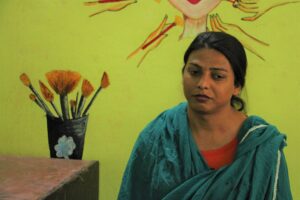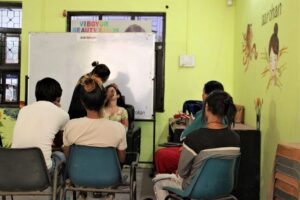International Transgender Day of Visibility: Third gender’s struggle for equality

According to NHRC about 92 pc of transgenders are deprived of the right to participate in any form of economic activity in India, with even qualified ones refused jobs (MIG photos/Aman Kanojiya)
“Earlier, while growing up, I used to think that I am the only boy in this world who feels like a girl, talks like a girl and who wants to dress up like girls. However, about 20 years ago all that changed when I met a group of transgenders and saw so many people like me. The group introduced me to fellow transgenders, and I was relieved. I was tired of my friends being ashamed to hang out with me, my relatives constantly complaining to my parents about the way I talked and behaved, and I was tired of the constant beatings from my father that made me think that it was time that I became part of a community where I would be accepted. Unfortunately, however, once I was part of the transgenders’ community, my life changed for the worse,” recalls Soniya (35), a transgender living in west Delhi.
Though numbering close to 500,000 as per Census of India in 2011, transgenders in India have been living on the fringes of society, shunned because of their gender identity issues. This has made many of them leave their homes and education and live on the streets or join a group of transgenders, earning a meagre livelihood by singing and dancing or by begging. Some are even forced to become sex workers as a last resort.
But lack of acceptance by the society is not the only challenge for transgenders like Soniya, who left her house in the year 2000. She says that more than acceptance or exploitation by the outer world, it is often leaders of transgender groups or ‘senior members’ of the group who exploit them and abuse them the most. “There is too much of politics here. We are like slaves to them. Transgenders who have been in the business for several years and are assigned a particular locality as in charge of the group and when we go to someone’s house to bless newly wedded couples or babies, people think that we are getting all the money. But that is not the case. We end up with a small fraction as all the money is taken by our seniors or group in charge, the guruma. For example, if we get INR 21,000, the entire money is handed over to the guruma who distributes it as per hierarchy and then gives us only INR 800-900 per visit.”
The gurumas control much more than money in a transgender’s life. Soniya says that her guruma used to exploit her, torture her with severe beatings and even starve her if she refused to follow her orders. “Just when I thought that maybe in my community, I will get due respect and acceptance, I realised that I was just a business prospect for them. They would ask me to clean their houses, sing, dance and entertain their guests. If there was even a small mistake that I made they used to stop giving me food and used to lock me up for days. On some days they used to not take us to work and refused to pay us on other days. And if we thought of leaving the house and shift to some other place, under some other head, they used to frame us for stealing. So the other person would never take us in. So, we were most of the times forced to turn back to that terrible life that we never wanted or dreamt of,” Soniya tells Media India Group.

Transgenders like Soniya say they have suffered the most at the hands of their own community (MIG photos)
Seeking a life with dignity
Finally, it was less than four years ago that Soniya found a ray of hope in her life. She came across Aarohan, a Delhi-based NGO that has been running a welfare and intervention progamme for the transgender community at Peeragarhi in northwest Delhi in collaboration with the Delhi State Aids Control Society. The centre caters to about 1225 transgenders, like Soniya, in the area who are considered to be in high-risk population of HIV. The programme helps the community with regular medical checkups and counselling as well as distribution of condoms to prevent HIV infection. The programme also helps them with preparation of official documents like identity cards, health cards and access to various government services.
In order to create a source of livelihood for the community, Aarohan has begun training them as beauticians and make-up artists. Rani Patel, founder of Aarohan, says that it is very important to offer transgenders jobs that they can relate to and can perform. “Very often, the thinking is to employ them as clerks or office staff, but the community members would hesitate since they are very insecure about working in a place with too many people and they fear harassment and exclusion. That’s why we chose to start course like make up since many transgenders have been attracted to make up since their childhood,” Patel tells Media India Group.
Attesting to Patel’s statement, Soniya says that she jumped at the opportunity of taking the course since it offered a release from life that she had been trapped in ever since she had left her home.
“There is no peace for people like us. I have somehow managed to survive and I pray that the rest of my remaining life I live with some dignity. That is why I am learning this make-up artist course, so that when I get the certificate, I can either work at some place or I can teach some other people like me and manage to live a life with some dignity,” says Soniya.
Besides training and helping in finding jobs for the transgenders, Aarohan has also employed some of them. Ram Prakash is one of them who is now running the centre at Peeragarhi. Patel says that over the years, Prakash has helped dozens of members of the community through counselling and training as well as helping them find suitable jobs.
Binnie, a 22-year-old transgender, studied up to class 12 and is now an outreach worker at Aarohan. Preity, another beneficiary of Aarohan’s intervention programme, has found a job with Noida Metro Rail Corporation where she is working as a housekeeping staff. Patel says she is one of the few fortunate persons in the transgender community to have secured a job in mainstream. Preity says that it was only possible because of Aarohan’s guidance and support. However, there are many in the community who are not as fortunate as Preity.
The first-ever study on the rights of transgenders in India by National Human Rights Commission is a proof of this. According to the study, about 92 pc of transgenders are deprived of the right to participate in any form of economic activity in the country, with even qualified ones refused jobs.
Patel also blames the big business of failing to play their part in increasing integration and acceptance of transgenders in the mainstream. “Big corporates only talk of supporting transgenders. But in reality, hardly anyone actually supports the cause with actions. That is why it took me 7-8 years to launch the beautician course,” she says.

Aarohan’s training centre for beauticians provides a path to economic independence for transgenders (MIG photos)
Remaining in the shadows
Estimates suggest despite the official count of barely 500,000, there are 5-6 million transgenders in India, but most keep it a secret to avoid discrimination. Patel says the acceptance of the transgenders by the society remains extremely low despite years of interventions by Aarohan and other NGOs. She says there is a high degree of distrust between the transgenders and the broader society. “Transgenders visibility in India is almost nil. The reason being both sides are apprehensive towards each other. The transgender people think that people outside their community will harm them and since they cannot trust them and the people are also unaware about them and they are afraid of them in general. Society is very critical, they don’t accept them. This is the biggest challenge in our country,” says Patel.
Often, fear of rejection or lack of acceptance makes some transgenders remain in the shadows and hide behind a façade of ‘normalcy’ as is the case with Ram Prakash, who has been working with Aarohan since 2013. He says he can relate to the discrimination that the transgenders have to face since childhood. “When I was in school in 2005, I understood that I was different. My classmates harassed me. Teachers also added to my difficulties as sometimes they made me class monitor thinking it will change other students’ attitude. Also, my own family was not understanding. And it was because of this that I started to lead a dual life,” Ram Prakash tells Media India Group.
Ram Prakash says that even though his mother has known the truth about him for a while, she refused to accept the idea and forced him to lead a dual life. “As a result, I am married now, and I even have a one-year-old child. However, I identify myself as a transgender person. My wife does not know about me even today,” he admits.
Soniya says that with her own experience, she counsels other transgenders to stay in the closet as being open about their identity crisis makes their life hell as hers has been. “People think that transgenders take the easy route. But can you imagine a transgender person who is out there the whole day waiting at signals to earn some money, how can they be looking for an easy way out. We are not scared of hard work. If we get government job, we can definitely work. But they do not anything for us. Even in private sectors no one is willing to employ us. When we go to people’s house to ask for money, they tell us that the government is doing so much for you, why don’t you work? We ask them, are they willing to employ us in their offices, to which they smile and refuse.”









